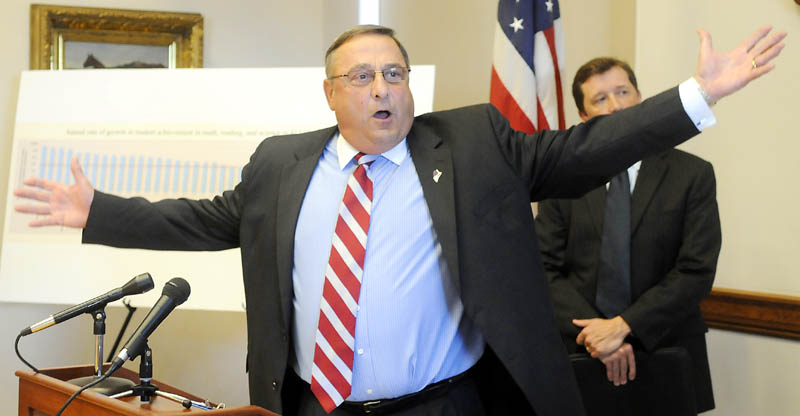AUGUSTA — Gov. Paul LePage said Wednesday he will propose a bill in the next legislative session that will require school districts to pay for their graduates’ remedial courses in college.
LePage cited the number of college students who need remedial classes as evidence of the ways Maine’s education system is failing students and taxpayers.
Fifty-four percent of students entering the Maine Community College System need to re-learn basic skills, as do 20 to 25 percent of students at the state’s four-year universities, LePage said.
“The parents of this state pay taxes for public education, then they have to pay a second time when their kids enter college,” LePage said. “That’s inappropriate.”
LePage and Education Commissioner Stephen Bowen outlined their educational priorities at a news conference Wednesday at the State House, proposing new ABCs: accountability, best practices and choice.
They discussed the results of a report released last week by Harvard University’s Program on Education Policy and Governance, which ranked Maine 40th out of 41 states in the study for growth in student test scores from 1992 to 2011.
The Maine School Management Association has said the governor isn’t telling the whole story. The nonprofit association of school boards and superintendents said last week Maine ranks among the top-performing states on the standardized test the Harvard study used as a foundation for its report.
LePage said Wednesday the reputation of Maine’s schools is suffering nationally. “I don’t care where you go in this country — if you come from Maine, you’re looked down upon now,” he said.
During the news conference, LePage said the College of William and Mary in Virginia, for example, requires Maine students to take a placement examination before even considering their applications.
However, college spokeswoman Suzanne Seurattan said later Wednesday said that’s not true, and that William and Mary has no separate examination requirements based on a student’s state of residency.
On his proposal for remedial courses, LePage said he does not know of any precedents in other states to require high schools to pay those costs, and he is exploring ways to implement it.
Last year, the Washington advocacy group Alliance for Excellent Education estimated that in the 2007-08 school year, Maine students spent $13 million on remedial courses.
“It’s going to be controversial, but you’ve got to hold their feet to the fire if you’re going to get these kids educated the way we expect them to be educated,” LePage said.
Bowen said officials already knew Maine scores on the National Assessment of Educational Progress were stagnant — or, in the case of fourth-grade reading, on the decline.
“What we learned from this report from Harvard, though, is the extent to which other states have aggressively moved to improve student outcomes,” Bowen said.
He said the Harvard report will guide Maine policymakers to look for lessons from the states and countries where student achievement is improving the fastest. The report’s authors said there may be a connection between education reform and stronger rates of improvement, but it is “only anecdotal, not definitive.”
Bowen and LePage said they think school choice will be key. Maine’s first charter schools will open this fall, and Bowen said the open-enrollment policy that failed in the last Legislature is very similar to the one in Delaware, which had the third-fastest growth in scores.
The fastest-improving state, however, was Maryland, which does not have open enrollment. Open enrollment does exist in two of the lowest-ranked states, Iowa and Wisconsin.
Bowen said the Department of Education will work with a stakeholder group and school-choice advocates such as the Milton and Rose Friedman Foundation for Educational Choice to create a new model for school choice. The stakeholder group’s findings are due to the Legislature in January.
The Department of Education also is developing a new accountability and improvement system for schools as part of an application to the federal government to be exempted from some sections of the federal No Child Left Behind law.
Bowen said that would not mean more testing. Instead, the state would track individual student growth over time to see where students are actually learning. Consequences for schools that don’t improve haven’t been decided, but LePage said they could include the state taking over operations.
LePage said educational institutions in Maine are too focused on administration and facilities, neglecting students and quality teaching. He said Maine has the smallest average class size in the nation, at 10.9 students per class, and spends far more per pupil than the national average, despite ranking 40th in teacher salaries.
A good teacher in a classroom with 25 students will produce better results than an average teacher with 10 students, LePage said. One alternative, already being used in some states, is having up to 500 students learn from a single excellent teacher through distance learning, with an educational technician in each physical classroom.
Maine Education Association President Lois Kilby-Chesly said distance learning and virtual education are not good for teachers or students.
Kilby-Chesly said the teachers’ union is in favor of accountability and best practices, but they oppose school choice because some schools could lose a lot of money if students go elsewhere.
The Associated Press contributed to this story
Copy the Story LinkSend questions/comments to the editors.



Success. Please wait for the page to reload. If the page does not reload within 5 seconds, please refresh the page.
Enter your email and password to access comments.
Hi, to comment on stories you must . This profile is in addition to your subscription and website login.
Already have a commenting profile? .
Invalid username/password.
Please check your email to confirm and complete your registration.
Only subscribers are eligible to post comments. Please subscribe or login first for digital access. Here’s why.
Use the form below to reset your password. When you've submitted your account email, we will send an email with a reset code.